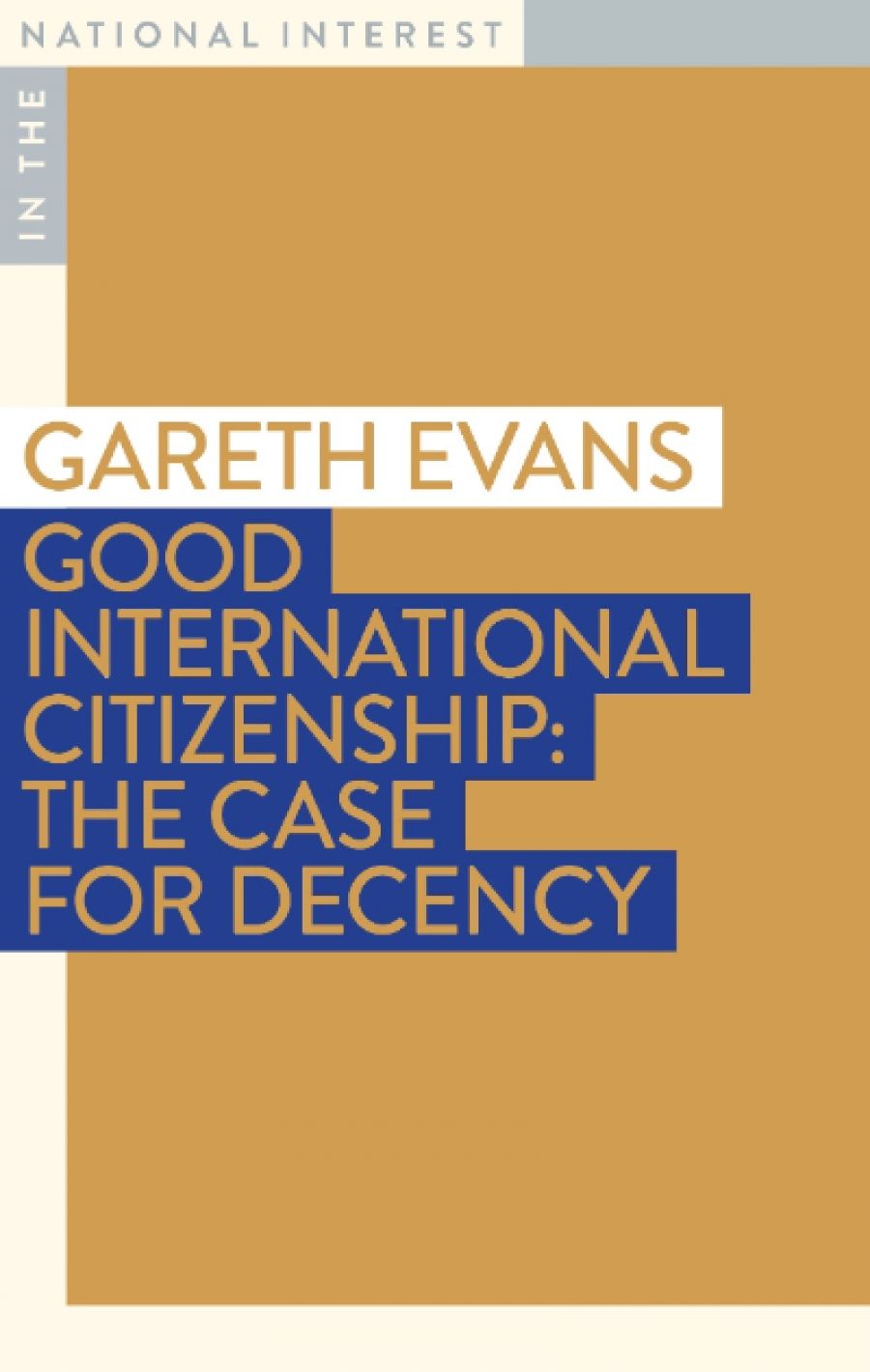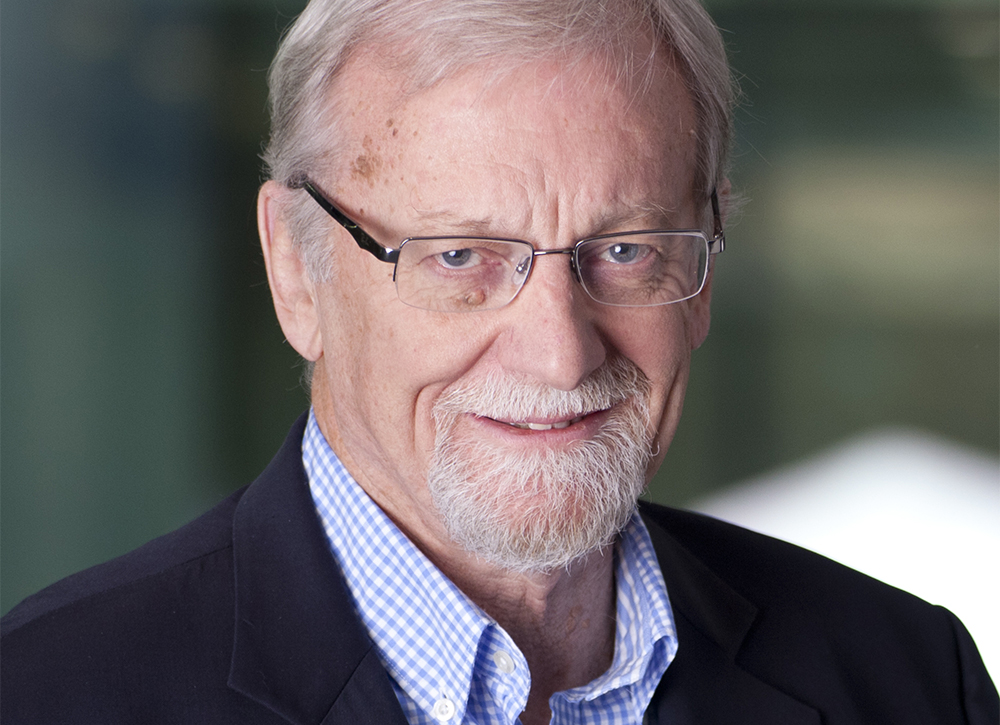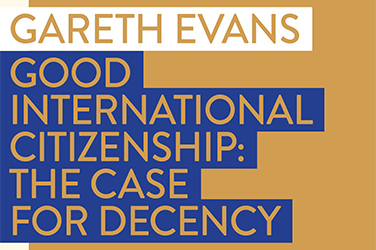
- Free Article: No
- Contents Category: Politics
- Review Article: Yes
- Article Title: Purposes beyond ourselves
- Article Subtitle: Gareth Evans on promoting decency
- Online Only: No
- Custom Highlight Text:
Over the course of a long and distinguished public life, Gareth Evans has held fast to his conviction that as individuals aspire to personal decency and moral behaviour, the same should be replicated among nations. As a foreign minister and an author, and in his international organisations and academic roles, Evans has consistently advocated ‘good international citizenship’. Care for our common humanity he sees as both a moral imperative and a national interest.
- Article Hero Image (920px wide):

- Article Hero Image Caption: Gareth Evans AO QC (photograph via University of Melbourne/Wikimedia Commons)
- Alt Tag (Article Hero Image): Gareth Evans AO QC (photograph via University of Melbourne/Wikimedia Commons)
- Featured Image (400px * 250px):

- Alt Tag (Featured Image): Alison Broinowski reviews 'Good International Citizenship: The case for decency' by Gareth Evans
- Book 1 Title: Good International Citizenship
- Book 1 Subtitle: The case for decency
- Book 1 Biblio: Monash University Publishing, $19.95 pb, 90 pp
- Book 1 Readings Link: booktopia.kh4ffx.net/9WYXJe
Diplomats know that reputation delivers tangible benefits. Having consistent ‘purposes beyond ourselves’ (Hedley Bull’s expression, which Evans recalls) is an investment in the soft power on which a middle-sized country like Australia depends. To be seen as unselfish, reliable, and constructive provides a basis for reciprocity. But Australia’s record denies us any such reputation. Our governments voluntarily joined wars of aggression in Vietnam and Iraq where we did more harm than good, as Evans says: and there were more. The United States is perpetually at war, and so Australia is too. We even want the United States to want us to fight, Evans adds. Repeatedly since 1945, Australia and our allies have fought losing wars and retreated. We fail to prevent nuclear proliferation, and now with AUKUS we may exacerbate it. But when other nations act aggressively, Australian governments confect outrage, citing the US-invented ‘international rules-based order’. Russia and China have taken to responding with reminders about the international law-based order to which Australia used to subscribe.
Evans’s book was finished in late 2021, before the recent federal election. Now we live in hope that the Albanese government may recall Menzies’ statement in 1955 that Australia was uninterested in a disastrous war over islands in the Taiwan Strait. The United States always wants a coalition: if Australia, Japan, and South Korea were to confirm their disinclination to join one against China, that disaster might be averted.
The test of Evans’s lifelong promotion of good international citizenship depends on its application in practice. He and others worked for years to devise the Responsibility to Protect (R2P) doctrine and steer it through the United Nations, culminating in its adoption in 2005. With Rwanda as his starting point, Evans cites how recurring violence was halted in Kenya, Sierra Leone, Liberia, Guinea, Gambia, Côte d’Ivoire, and Kyrgyzstan, and how R2P attracted the unprecedented attention of the Security Council with regard to situations elsewhere. But he knows that failure is publicly more noticed than success. Some R2P interventions, he admits, were only partially successful, and he counts as failures Sri Lanka, Myanmar, Yemen, and Syria.
Evans’s diligent ‘work in progress’ that is R2P, despite its acceptance by the UN General Assembly, has been suspected in some countries of being another plot of the West against the rest. Dressing an initiative up as R2P doesn’t give rich and powerful nations the right to take action in troubled states. Speaking of ‘protection’ rather than ‘intervention’ fails to convince those who have seen it all before. Evans’s hope to have R2P become the humane substitute for military action, using sanctions and criminal prosecutions instead, is principled and pious. But it hasn’t succeeded in reducing armed violence or geopolitical rivalry, for much of which, including war crimes, the United States and Australia and their allies are responsible.
Unlike Australia, the United States doesn’t even recognise the International Criminal Court, and America under President Donald Trump actively obstructed it. As John Menadue observed in Pearls and Irritations on 3 August, the United States is a belligerent nation which ‘has been at war 93 per cent of the time. These wars have extended from its own hemisphere to the Pacific, to Europe and most recently to the Middle East. The US has launched 201 out of 248 armed conflicts since the end of World War II.’ Australia, having been complicit in some of these more recent wars, has its own morality and responsibility for war crimes to deal with. Another problem with international perceptions of R2P is its selectivity. Does R2P, for example, justify intervention in Afghanistan on behalf of women – half the population – who may be even more oppressed under the Taliban government than ever before? Or those in Saudi Arabia? Evans doesn’t mention women, but he does raise Uighurs. Does R2P justify intervention in China on their behalf, in response to allegations by US-funded expatriate groups of genocide, which the PRC denies? What sanctions and criminal prosecutions – the tactics of R2P – will work in these cases?
Under Louise Adler’s expert guidance, Monash University Publishing’s In the National Interest rewardingly takes the place of MUP’s ‘On’ topics. Both series of small books make important contributions to discussion currently absent from the mainstream media. There, questions about Australia’s global citizenship, or our current hostility to Russia and China, are rarely asked or answered. Nor is there any argument about the failure of war itself to resolve international conflict.


Comments powered by CComment